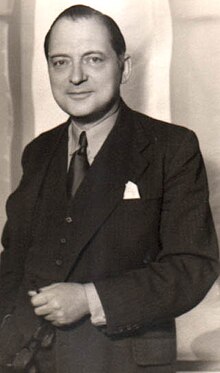Carl Werner Dankwort
Carl Werner Dankwort (born August 13, 1895 in Gumbinnen , East Prussia , † December 19, 1986 in Hyannis , Massachusetts ) was a German diplomat . He was a driving force behind the admission of the German Reich into the League of Nations in 1926. After the end of World War II , he represented the Federal Republic of Germany in the OECD .
Life
After graduation and one semester of law studies, Dankwort became a soldier in the First World War from September 1914 to November 1918 and retired as a first lieutenant. He completed his studies in Berlin and Halle in 1920 with a doctorate from the Julius Maximilians University of Würzburg . Graduated from law school (October 24, 1919). He was drafted into the Foreign Service on April 30, 1920 and began in 1922 as an attaché at the German legation in Switzerland , where the social democrat Adolf Müller had been the ambassador since 1919. The next foreign stations were the consulate in Zurich and in 1927 the embassy in Stockholm . In 1931 he went back to Bern and took part in the Geneva Disarmament Conference in 1932 and 1933 (German National Library).
After the transfer of power to the National Socialists , the envoy Müller was retired in July 1933 for reasons of age, his successor was Ernst von Weizsäcker . In 1936, in connection with the Gustloff case because of “political unreliability”, a word of thanks was banned from carriage and transferred to the consulate in Trieste as acting head . Since Dankwort had an excellent knowledge of the Swedish culture and language, he was reassigned to the German mission in Stockholm, where he became first secretary. After the end of the war he agreed to testify as a witness for the prosecution at the Nuremberg trials . After his return to Germany in October 1945, however, he was interned by the British until February 1947.
Dankwort returned to the diplomatic service in 1950 after the Federal Republic was founded. In 1951 he was first consul general and then ambassador to Canada , where he helped to improve relations between the two states after the war. From 1956 to 1958 he represented Germany as ambassador to Brazil , then as an observer to the United Nations .
Since 1919 he was a member of the Corps Vandalia Berlin .
Honors
- 1953: Large Cross of Merit with Star of the Federal Republic of Germany
- In Sweden he received the Swedish Cross as Commander of the Vasa Order .
family
Werner Dankwort married Irma Salvisberg in 1938 and together they raised their sons Rudolf and Jürgen.
Dankwort and his wife shared anti-Nazi sentiments and mentally opposed Hitler's rule. Both moved to Sweden, which was neutral during World War II . Werner Dankwort's strategic position as advisor to the German delegation in Stockholm enabled him to invade and divert National Socialist projects in Sweden and occupy the country
This allowed Sweden to continue to serve as a refuge for those in need of protection who were threatened with persecution, incarceration and extermination by the Nazis.
Rudolf Dankwort studied at Harvard University before completing his degree in electrical engineering at Duke University in North Carolina. He married and settled in Phoenix, Arizona.
Jürgen Dankwort returned to Canada when the Americans were at war in Vietnam and completed his studies at McGill University . He received his PhD in Social Work from the Université de Montréal in 1994 and moved to Vancouver, British Columbia. There he teaches and researches and works as a social activist for human rights and against social injustice. He is the director of the Institute on Victimization and Social Injustice.
Werner Dankwort's wife Irma, who did voluntary service as a nurse's helper in Stockholm during the war, died on February 9, 1999.
literature
- Walther Killy , Rudolf Vierhaus (ed.): German Biographical Encyclopedia . Volume 2, KG Saur Verlag, Munich 1996, ISBN 3-598-23163-6 , p. 442.
- Maria Keipert (Red.): Biographical Handbook of the German Foreign Service 1871–1945. Published by the Foreign Office, Historical Service. Volume 1: A-F. Schöningh, Paderborn et al. 2000, ISBN 3-506-71840-1 .
- René Moehrle: Persecution of Jews in Trieste during Fascism and National Socialism 1922–1945. Berlin 2014, ISBN 978-3-86331-195-7 , pp. 165-174.
Individual evidence
- ^ Catalog of the German National Library. In: portal.dnb.de. Retrieved December 12, 2016 .
- ↑ Short biography at the Archives for Contemporary History at ETH Zurich, (online)
- ↑ Kösener Corps lists 1960, 7 , 290 ( 8 , 31)
- ↑ Klemens Von Klemperer: German Resistance Against Hitler: The Search for Allies Abroad, 1938-1945 . Ed .: Clarendon Press Oxford, 1992.
- ↑ 1 Archives - Respons. In: Respons. Retrieved December 12, 2016 (American English).
| predecessor | Office | successor |
|---|---|---|
| Georg von Broich-Oppert |
Head of the Permanent Mission of the Federal Republic of Germany to the United Nations 1958 - 1960 |
Karl Heinrich Knappstein |
| personal data | |
|---|---|
| SURNAME | Word of thanks, Carl Werner |
| ALTERNATIVE NAMES | Thank you, Werner |
| BRIEF DESCRIPTION | German diplomat |
| DATE OF BIRTH | August 13, 1895 |
| PLACE OF BIRTH | Gumbinnen |
| DATE OF DEATH | December 19, 1986 |
| Place of death | Hyannis , Massachusetts |
